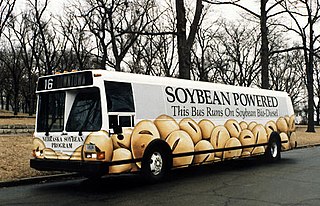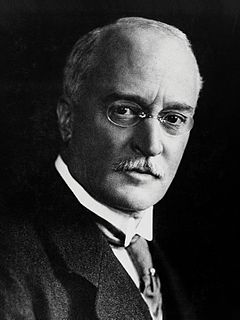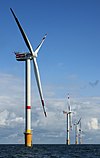
A biofuel is a fuel that is produced through contemporary processes from biomass, rather than a fuel produced by the very long-winded geological processes involved in the formation of fossil fuels, such as oil. Since biomass technically can be used as a fuel directly, some people use the terms «biomass» and «biofuel» interchangeably. More often than not however, the word «biomass» simply denotes the biological raw material the fuel is made of, or some form of thermally/chemically altered solid end product, like torrefied pellets or briquettes. The word «biofuel» is usually reserved for liquid or gaseous fuels, used for transportation. The EIA follow this naming practice. If the biomass used in the production of biofuel can regrow quickly, the fuel is generally considered to be a form of renewable energy.

Biodiesel refers to a vegetable oil- or animal fat-based diesel fuel consisting of long-chain alkyl esters. Biodiesel is typically made by chemically reacting lipids with an alcohol producing fatty acid esters.

Alternative energy is any energy source that is an alternative to fossil fuel. These alternatives are intended to address concerns about fossil fuels, such as its high carbon dioxide emissions, an important factor in global warming. Marine energy, hydroelectric, wind, geothermal and solar power are all alternative sources of energy.

Sustainable energy is a principle in which human use of energy "meets the needs of the present without compromising the ability of future generations to meet their own needs." Sustainable energy strategies generally have two pillars: cleaner methods of producing energy and energy conservation.
Biomass to liquid is a multi-step process of producing synthetic hydrocarbon fuels made from biomass via a thermochemical route. Such a fuel has been called grassoline.
Vegetable oil can be used as an alternative fuel in diesel engines and in heating oil burners. When vegetable oil is used directly as a fuel, in either modified or unmodified equipment, it is referred to as straight vegetable oil (SVO) or pure plant oil (PPO). Conventional diesel engines can be modified to help ensure that the viscosity of the vegetable oil is low enough to allow proper atomization of the fuel. This prevents incomplete combustion, which would damage the engine by causing a build-up of carbon. Straight vegetable oil can also be blended with conventional diesel or processed into biodiesel or bioliquids for use under a wider range of conditions.
Pyrolysis oil, sometimes also known as biocrude or bio-oil, is a synthetic fuel under investigation as substitute for petroleum. It is obtained by heating dried biomass without oxygen in a reactor at a temperature of about 500 °C with subsequent cooling. Pyrolytic oil is a kind of tar and normally contains levels of oxygen too high to be considered a hydrocarbon. This high oxygen content results in non-volatility, corrosiveness, immiscibity with fossil fuels, thermal instability, and a tendency to polymerize when exposed to air. As such, it is distinctly different from petroleum products. Removing oxygen from bio-oil or nitrogen from algal bio-oil is called upgrading.
Renewable fuels are fuels produced from renewable resources. Examples include: biofuels and Hydrogen fuel. This is in contrast to non-renewable fuels such as natural gas, LPG (propane), petroleum and other fossil fuels and nuclear energy. Renewable fuels can include fuels that are synthesized from renewable energy sources, such as wind and solar. Renewable fuels have gained in popularity due to their sustainability, low contributions to the carbon cycle, and in some cases lower amounts of greenhouse gases. The geo-political ramifications of these fuels are also of interest, particularly to industrialized economies which desire independence from Middle Eastern oil.

Biofuel is fuel that is produced from organic matter (biomass), including plant materials and animal waste. It is considered a renewable source of energy that can assist in reducing carbon emissions. The two main types of biofuel currently being produced in Australia are biodiesel and bioethanol, used as replacements for diesel and petrol (gasoline) respectively. As of 2017 Australia is a relatively small producer of biofuels, accounting for 0.2% of world bioethanol production and 0.1% of world biodiesel production.
A low-carbon economy (LCE), low-fossil-fuel economy (LFFE), or decarbonised economy is an economy based on low carbon power sources that therefore has a minimal output of greenhouse gas (GHG) emissions into the biosphere, but specifically refers to the greenhouse gas carbon dioxide. GHG emissions due to anthropogenic (human) activity are the dominant cause of observed global warming since the mid-20th century. Continued emission of greenhouse gases may cause long-lasting changes around the world, increasing the likelihood of severe, pervasive and irreversible impacts for people and ecosystems.

Vegetable oils are increasingly used as a substitute for fossil fuels. Vegetable oils are the basis of biodiesel, which can be used like conventional diesel. Some vegetable oil blends are used in unmodified vehicles, but straight vegetable oil needs specially prepared vehicles which have a method of heating the oil to reduce its viscosity and surface tension. Another alternative is vegetable oil refining.
Second-generation biofuels, also known as advanced biofuels, are fuels that can be manufactured from various types of non-food biomass. Biomass in this context means plant materials and animal waste used especially as a source of fuel.

Renewable energy in Finland grew to 38.7% of total final energy consumption by year end 2014, achieving joint second position with Latvia in terms of renewable energy consumption by share amongst the EU-28 countries, behind its neighbour Sweden in first position on a 52.6% share. The 2014 share in Finland breaks down as renewable energy providing 52% of the heating and cooling sector, 31.4% of the electricity sector and 21.6% of the transport sector. By 2014 Finland had already exceeded its 2020 target for renewable energy use under the EU renewable energy directive as shown in the table of country targets.
Vegetable oil refining is a process to transform vegetable oil into biofuel by hydrocracking or hydrogenation. Hydrocracking breaks big molecules into smaller ones using hydrogen while hydrogenation adds hydrogen to molecules. These methods can be used for production of gasoline, diesel, propane, and other chemical feedstock. Diesel fuel produced from these sources is known as green diesel or renewable diesel.
The environmental impact of biodiesel is diverse.
There are various social, economic, environmental and technical issues with biofuel production and use, which have been discussed in the popular media and scientific journals. These include: the effect of moderating oil prices, the "food vs fuel" debate, poverty reduction potential, carbon emissions levels, sustainable biofuel production, deforestation and soil erosion, loss of biodiversity, effect on water resources, the possible modifications necessary to run the engine on biofuel, as well as energy balance and efficiency. The International Resource Panel, which provides independent scientific assessments and expert advice on a variety of resource-related themes, assessed the issues relating to biofuel use in its first report Towards sustainable production and use of resources: Assessing Biofuels. In it, it outlined the wider and interrelated factors that need to be considered when deciding on the relative merits of pursuing one biofuel over another. It concluded that not all biofuels perform equally in terms of their effect on climate, energy security and ecosystems, and suggested that environmental and social effects need to be assessed throughout the entire life-cycle.

Energy in Sweden describes energy and electricity production, consumption and import in Sweden. Electricity sector in Sweden is the main article of electricity in Sweden. Swedish climate bill Feb 2017 aims to make Sweden carbon neutral by 2045. Swedish target is to decline emission of climate gases 63% from 1990 to 2030 and international transportation excluding foreign flights 70%. By 2014 just over half of the country's total final energy consumption in electricity, heating and cooling and transport combined was provided by renewables, the highest share amongst the 28 EU member countries.

Carbon-neutral fuel is energy fuel or energy systems which have no net greenhouse gas emissions or carbon footprint. One class is synthetic fuel produced from renewable, sustainable or nuclear energy used to hydrogenate carbon dioxide directly captured from the air (DAC), recycled from power plant flue exhaust gas or derived from carbonic acid in seawater. Renewable energy sources include wind turbines, solar panels, and hydroelectric power stations. Another type of renewable energy source is biofuel. Such fuels are potentially carbon-neutral because they do not result in a net increase in atmospheric greenhouse gases.
Biofuels play a major part in the renewable energy strategy of Denmark. Denmark is using biofuel to achieve its target of using 100% renewable energy for all energy uses by 2050. Biofuels provide a large share of energy sources in Denmark when considering all sectors of energy demand. In conjunction with Denmark's highly developed renewable energy resources in other areas, biofuels are helping Denmark meet its ambitious renewable energy targets.
















